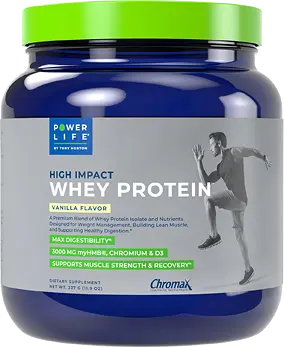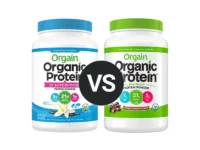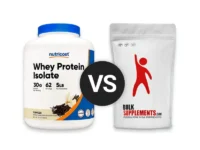Knowledge BaseYou're Questions Answered
Can protein powder interact with any medications?
Yes, protein powder can potentially interact with certain medications, affecting their absorption, metabolism, or overall effectiveness. While protein powders are typically safe for most individuals, it's essential to be aware of how they might influence or interfere with medications, particularly if you're managing chronic conditions or taking multiple prescriptions.
Common Interactions Between Protein Powder and Medications
- Levodopa and Parkinson’s Medications
Protein powder, especially those high in animal protein, can interfere with the absorption of medications like levodopa, which is commonly used to treat Parkinson’s disease. The competition between amino acids from protein and the drug can reduce the effectiveness of the medication, requiring close monitoring by healthcare professionals1. - Calcium-Rich Protein Powders and Antibiotics
Protein powders enriched with added calcium, such as those derived from dairy, can hinder the absorption of certain antibiotics, particularly tetracycline and ciprofloxacin. Calcium binds with these antibiotics in the stomach and intestines, preventing full absorption and reducing the drug's effectiveness2. To avoid this interaction, it's advisable to space out the intake of calcium-rich protein powders and antibiotics by at least two hours. - Protein and Blood Thinners (Warfarin)
High protein intake, particularly from animal sources, may alter how your body metabolizes medications like warfarin, a common blood thinner. This can increase blood clotting factors, potentially counteracting the medication's intended effect and increasing the risk of complications3. Regular monitoring of blood clotting levels (INR) is essential if you are consuming a high-protein diet or supplement. - Diabetes Medications and Glucose Control
Protein powder, especially in large amounts, can affect blood sugar levels and glucose metabolism. For individuals taking insulin or other diabetes medications, protein may alter postprandial glucose levels, potentially lowering blood sugar levels. This can impact the dosage of diabetes medications4. Consultation with a healthcare provider is crucial to adjust medications accordingly.
Consulting a Healthcare Provider
It’s important to consult with a healthcare provider before starting any new protein supplement, particularly if you are taking medications for conditions such as diabetes, heart disease, or kidney disorders. These conditions can be sensitive to dietary changes, and certain medications may require dosage adjustments based on your protein intake. Working closely with your doctor ensures that your diet and medications are balanced for optimal health and effectiveness5.
- Contin, M., & Martinelli, P. (2010). Pharmacokinetic optimisation in the treatment of Parkinson's disease: an update. Clinical Pharmacokinetics, 49(5), 349-369.
- Stahlmann, R., & Lode, H. (2013). Safety considerations of fluoroquinolones in the elderly: an update. Drugs & Aging, 30(2), 113-132.
- Johnson, J. R., & Warfarin, D. (2011). High protein diet and its effects on anticoagulation. The American Journal of Medicine, 124(10), 10-14.
- Monnier, L., Colette, C., & Owens, D. (2012). Postprandial and basal glucose in type 2 diabetes: Assessment and respective impacts. Diabetes & Metabolism, 38(2), S7-S11.
- Turner, R., & Holman, R. (2019). Dietary considerations for patients with type 2 diabetes and implications for the use of supplements. New England Journal of Medicine, 381(14), 1358-1366.
Related Questions

Your Answer
We are a participant in the Amazon Services LLC Associates Program, an affiliate advertising program designed to provide a means for us to earn fees by linking to Amazon.com and affiliated sites.






